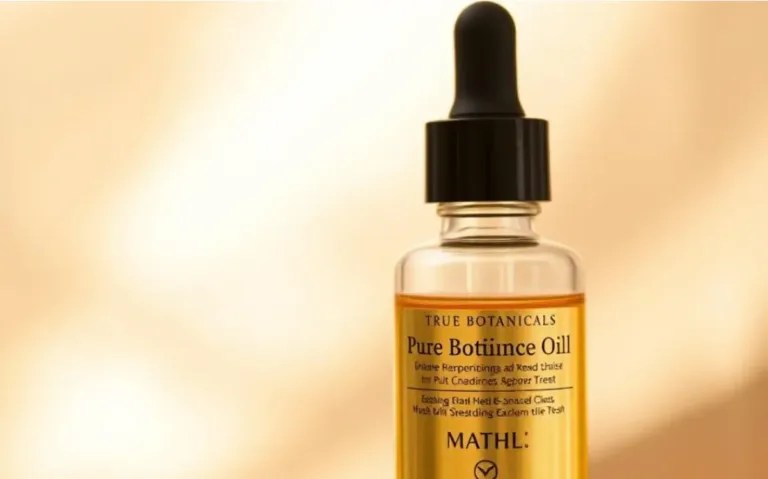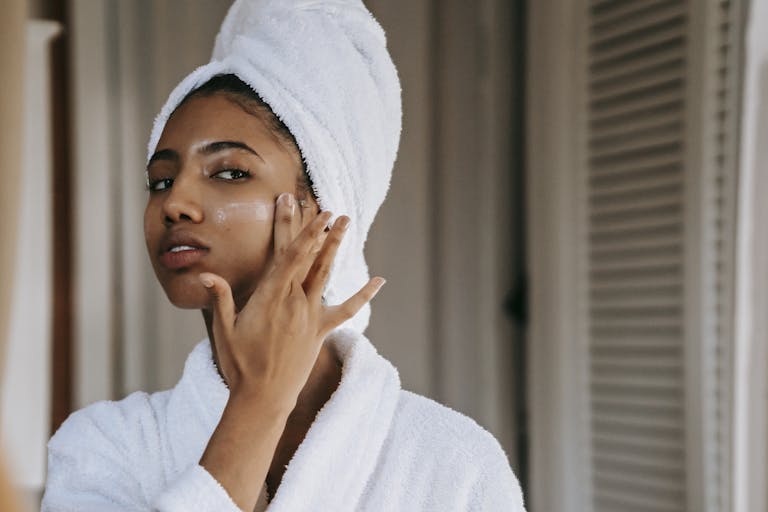Foods to Avoid for Healthy Skin – Top Culprits
Want healthy, glowing skin? It’s more than what you put on your face. Your diet affects your skin’s health too. Some foods can make skin issues worse, causing acne, rashes, or dryness. By steering clear of these foods, you can keep your skin looking great.
Sarah, a 30-year-old, was fighting frequent acne. She was dedicated to her skincare, using top-notch products daily. But, her acne wouldn’t go away, leading her to question everything.
When she saw a dermatologist, Sarah’s life changed. Her doctor looked beyond her skincare and into her diet. Sarah never realized food could impact her skin.
After some digging, Sarah found her favorite foods might be the problem. Some foods can cause inflammation and mess with skin balance. They were stopping her skin from being clear and healthy.
Key Takeaways:
- Avoiding certain foods can help maintain clear and radiant skin.
- Certain foods can aggravate or trigger skin issues such as acne and inflammation.
- By identifying and avoiding skin-aggravating foods, you can promote healthier skin.
- Consult with a dermatologist or healthcare professional for personalized advice on maintaining optimal skin health through diet.
- Stay tuned for our next sections where we delve into specific foods to avoid for healthier skin.
The Skin-Aggravating Effects of Dairy Consumption
Dairy has always been linked to skin problems, like acne. A lot of dairy foods have hormones. These can make your skin produce more oil, which leads to pimples. Foods like milk, cheese, yogurt, and ice cream can make your skin worse. Also, these hormones from dairy can mess with your body’s balance, causing more skin issues.
Common Dairy Products That May Worsen Skin Health
Some dairy items don’t help your skin at all. This includes:
- Milk: It has hormones that make your skin oily and can block pores, causing acne.
- Cheese: A fatty dairy product that might make your skin worse, leading to redness and pimples.
- Yogurt: Even though it can be healthy, the hormones in yogurt might affect your skin negatively.
- Ice Cream: This favorite treat’s high sugar and fat can hurt your skin, causing soreness and acne.
Understanding the Hormonal Impact of Dairy on the Skin
Dairy’s hormones, like estrogen, progesterone, and IGF-1, greatly affect skin. They change the body’s hormone balance. This leads to more oil, soreness, and blocked pores. This can make acne and other skin issues worse.
Non-Dairy Alternatives for a Clearer Complexion
If you want to avoid dairy’s bad effects on skin, try non-dairy products. Here are some options:
- Plant-based milks: Almond, oat, and coconut milks work well in many recipes. They are great milk substitutes.
- Vegan cheeses: Made from nuts or soy, they feel like regular cheese but are better for your skin.
- Non-dairy yogurts: Soy, almond, or coconut yogurts in various flavors make a good swap for dairy yogurt.
- Dairy-free frozen desserts: Choose fruit sorbets or dairy-free ice creams for a skin-friendly treat.
By picking these non-dairy foods, you can keep enjoying meals while helping your skin look and feel better.

Alcohol and Your Complexion: A Dry Outlook
How Alcohol Dehydration Affects Skin Health
Drinking alcohol may seem fun, but it’s bad for your skin. Alcohol makes your body lose water and dries out your skin. This makes your skin look dull, dry, and older. It’s also more likely to get wrinkles and fine lines.
Alcohol stops your body from making a hormone called vasopressin. Vasopressin is important for keeping water inside your body. Without it, your skin gets dry because it can’t keep moisture.
Then, dehydrated skin isn’t just bad for looks. It also harms the skin’s health. Dry skin loses its stretchiness and gets easily irritated. This can make skin problems like eczema and psoriasis worse.
The Sugary Trap in Alcoholic Beverages
Cocktails and sweet alcoholic drinks are double trouble for your skin. They’re full of sugar.
Too much sugar leads to inflammation in your entire body, skin included. This can make your skin’s building blocks, collagen fibers, weak and stiff. So, you get wrinkles before your time.
Sugar also messes with your hormones and can cause acne. It raises the level of insulin, leading to more oil in your skin. This can clog your pores and create pimples and blackheads.
Watch how much sweet alcohol you drink. Consider drinks that are low in sugar or choose water or herbal teas. Be good to your skin by picking healthier options.

Foods to Avoid for Healthy Skin: High-Glycemic Index Foods
Your diet plays a big role in keeping your skin healthy and clear. Some foods, like white bread and potatoes, can be bad for your skin. These foods quickly raise your blood sugar, prompting your body to release insulin.
Insulin can make your skin worse. It can cause inflammation, which might lead to acne. So, it’s wise to watch how much high-glycemic foods you eat.
Choose foods with a low-glycemic index instead. This will be better for your skin. Low-glycemic foods include fresh fruits, veggies, whole grains, and lean meats.
Eating low-glycemic foods helps support skin health. It lowers the chance of skin problems related to sugar spikes and inflammation.
| High-Glycemic Index Foods | Low-Glycemic Index Foods |
|---|---|
| White bread | Whole grains |
| Potatoes | Fresh fruits and vegetables |
| Watermelon | Lean proteins |
Refined Carbohydrates and Their Relationship to Acne
Eating right is key to clear and healthy skin. Food like white flour and sugar can cause acne. They hurt your skin by messing with insulin. But, you can fix this by eating better and getting glowing skin.
Effects of Refined Carbs on Insulin and Acne
White bread, pasta, and sweet treats spike your insulin. Insulin manages blood sugar. But, too much means trouble for your skin. It causes inflammation and acne.
Foods high in sugars make more sebum, the oily stuff leading to acne. Cut back on these foods to keep your insulin in check and avoid breakouts.
Replacing High-Glycemic Carbs for Clearer Skin
Choose whole grain bread and pasta over white types. They don’t mess with your blood sugar as much. This small change can keep your skin clear.
Eat fruits instead of sugary snacks for clearer skin. Fruits have natural sugars and skin-healthy vitamins.
Complex carbs like brown rice keep your energy stable and insulin low. Veggies, protein, and healthy fats are also great for your skin.
Choosing natural, unprocessed carbs helps your skin shine. It’s an easy way to eat for better skin.
| Refined Carbohydrates to Avoid | Healthier Alternatives |
|---|---|
| White bread | Whole wheat bread or sprouted grain bread |
| White pasta | Whole grain pasta or vegetable-based noodles |
| Sugary desserts | Fresh fruits or homemade treats with natural sweeteners |
| Processed snacks | Nuts, seeds, or homemade granola bars |
Battling Breakouts: Problematic Processed Foods
It’s crucial to watch what you eat for healthy skin. Processed foods like snacks, fast food, and pre-packaged meals can hurt your skin. They’re full of bad fats, sugars, and additives that cause swelling and acne.
Bad fats in these foods mess up your skin’s natural balance, causing acne and swelling. Sugars are also bad, spiking your blood sugar and making your skin worse.
The bad stuff doesn’t stop there. Additives like preservatives and artificial flavors can make your skin more irritated and oily. They also help acne grow.
To keep your skin clear, avoid processed foods. Choose whole foods instead. They’re full of nutrition that supports your skin, like vitamins, minerals, and antioxidants. Foods like fruits, veggies, lean meats, whole grains, and healthy fats are great for you.

| Processed Foods | Effects on Skin |
|---|---|
| Snacks | Promote inflammation and breakouts |
| Fast food | High in unhealthy fats and additives |
| Pre-packaged meals | Contain refined sugars and preservatives |
Choosing whole foods helps your skin. Your skin will be clearer and brighter!
Fatty Foods: Inflammatory Agents for your Skin
Fatty foods, like those high in trans and saturated fats, cause skin inflammation. They can make your skin prone to acne and other issues.
Think of foods like french fries and deep-fried snacks. They’re cooked in bad oils and can mess up your skin health. They make your skin produce more oil, block pores, and cause pimples.
Trans fats, often in packaged foods, boost body inflammation that shows in your skin. Always check food labels to stay away from these fats. This is a good step to keep your skin healthy.
Even saturated fats from fatty meats and dairy can make acne and skin irritation worse. So, it’s smart to eat less of these for your skin’s sake.
To enjoy clearer skin, cut back on fatty foods. Instead, eat foods like salmon and walnuts, rich in omega-3. They fight inflammation and are good for your skin. Also, choose grilling or baking food instead of frying to cut down on skin issues.
| Fatty Foods to Avoid | Healthier Alternatives |
|---|---|
| Fried foods (french fries, onion rings, etc.) | Grilled or baked options |
| Processed and packaged foods with trans fats | Whole, unprocessed foods |
| Fatty meats (sausages, bacon, etc.) | Lean meats or plant-based protein sources |
| High-fat dairy products (butter, full-fat cheese, etc.) | Low-fat or plant-based dairy alternatives |
Choosing healthier fats can make a big difference. It helps your skin stay less inflamed and clearer.
The Surprising Skin Impact of Chicken and Hormones
You might not think eating chicken could affect your skin much. But, it can, especially if it’s not organic. Non-organic chicken often has hormones, which can mess with your body’s balance and cause skin problems.
Identifying Hormone-Packed Poultry in Your Diet
Finding out if your chicken has hormones is hard. Most conventionally raised chickens get these hormones to grow faster. This means when you eat non-organic chicken, you might be getting hormones too, which can harm your skin.
To be safe, go for organic chicken. This kind is free from added hormones and antibiotics. It’s a better choice for your skin and health.
Exploring the Link Between Chicken Consumption and Skin Flare-Ups
The link between chicken and skin problems is not clear for everyone. Some people might see skin issues after eating non-organic chicken. This could be acne or red, inflamed skin.
Choosing organic can reduce your skin’s risk. It’s a more natural option that’s better for both you and the environment.
Always talk to a health expert. They can give you the best advice for your skin and diet.

Decoding the Connection Between Coffee and Acne
Coffee is a favorite morning pick-me-up for many. Yet, it might surprise you to learn about its link to acne. The caffeine in coffee can mess with your hormones and how much oil your skin makes. Watch how much coffee you drink and maybe swap it with something less harsh on your skin.
Drinking coffee can crank up your body’s stress hormone, cortisol. High cortisol boosts how much oil your skin produces. This can lead to clogged pores and breakouts, making acne worse for some people who already get it a lot.
If you’re dealing with more acne or want to avoid future flare-ups, cutting down on coffee could help. You might replace it with drinks that are low in caffeine or don’t have any at all. Herbal teas, green tea, and decaf coffee are good choices. They still give you a warm drink but are kinder to your skin.
Not everyone’s skin reacts the same way to coffee. Some folks are more affected by caffeine’s buzz, skin-wise. Paying attention to how your skin reacts and tweaking your coffee habits could be the key to a clearer face.
Enjoying coffee in moderation is fine, but remember a full-skin care plan. This includes eating well, drinking enough water, and sticking to a skincare routine. If you’re having skin issues, getting advice from a skin expert or doctor can be really helpful for figuring out what’s best for you.
Alternative Beverages for Skin Health
| Beverage | Description |
|---|---|
| Herbal teas | Non-caffeinated teas made from various herbs and botanicals, offering a range of flavors and potential health benefits. |
| Green tea | Contains less caffeine than coffee and is rich in antioxidants, providing potential skin health benefits. |
| Decaffeinated coffee | A coffee alternative with reduced caffeine content, offering a similar taste without the stimulating effects on the skin. |

Investigating Whey Protein as a Pimple-Provoking Food
Whey protein is often found in protein supplements. It’s under the spotlight for its possible link to acne. The amino acids in whey protein might boost the growth of skin cells. This can lead to increased oil, which might cause acne.
Why Athletes May Experience More Acne
Athletes often take a lot of protein supplements. This could make them more at risk for acne. The mix of intense exercise and higher whey protein intake might mess with their hormones. This, in turn, could lead to more acne.
Alternative Protein Sources for Active Individuals
If you’re after clear skin but need protein, there are other options. Try looking into plant-based proteins like soy, pea, or hemp. They offer essential amino acids and nutrients. Best of all, they might not cause the same skin issues that whey protein does.
Highly Processed Convenience Foods and Skin Health
Your diet is super important for keeping your skin healthy. Foods like quick snacks and fast food might be handy but they’re not great for your skin. They are full of bad fats, sugars, and extras that can cause your skin to get inflamed and break out.
The Role of Unhealthy Fats in Skin Inflammation
Bad fats in these foods can make your skin inflamed. They cause your body to make chemicals that mess up your skin’s natural state. This can lead to various skin problems.
Too many bad fats can also mess up the balance between certain fatty acids. This can make skin issues worse, like making acne more likely.

Seeking Wholesome Meals over Processed Fast-Fixes
Eating fresh, unprocessed food is key to healthy skin. Choosing meals with fruits, veggies, lean meats, and whole grains gives your skin necessary nutrients. This helps keep your skin looking clear and bright.
Instead of fast food, try making your own meals or getting healthy ready-to-eat options. Then, you can know exactly what you’re eating and make sure it’s good for your skin.
When you cook, use ingredients that are good for your skin. Things with a lot of antioxidants, such as berries and greens, help your skin by fighting off some damage. This keeps your skin looking and feeling its best.
Switching to healthier meals from quick, processed ones can do a lot for your skin. It makes skin issues less likely and keeps your skin healthier.
Conclusion
Maintaining a healthy diet is key to clear and healthy skin. Avoiding certain foods will help your skin. You should skip on dairy, alcohol, and sugary foods, among others. These items can make skin problems worse or lead to a dull complexion.
Instead, choose foods that are good for your skin. Eat lots of fruits, vegetables, and lean proteins. Also, consider whole grains and plant-based foods. These options are packed with nutrients, vitamins, and antioxidants. They keep your skin looking fresh and bright.
Remember, everyone reacts differently to food and its impact on the skin. For personalized advice, see a healthcare professional or dermatologist. They can give you tips that are right for you. This is especially true if you have skin conditions which may need special care through diet.
FAQ
What are the top foods to avoid for healthy skin?
For healthy skin, it’s best to avoid dairy products and alcohol. Also stay away from high-glycemic index foods, refined carbohydrates, and processed foods. Other items to keep off your plate are fatty foods, chicken with added hormones, and convenience foods.
How does dairy consumption affect skin health?
Consuming dairy, like milk or cheese, can make your skin worse. These items have hormones that make your skin produce more oil. This can clog your pores and cause breakouts. These extra hormones can also mess with your body’s hormonal balance, making skin problems worse.
What are some non-dairy alternatives for clearer skin?
To keep your skin clear, switch to plant-based milks like almond or coconut milk. You can also try oat milk. For snacks, use vegan cheese, yogurt, or ice cream made with almond, coconut, or soy milk. These changes can improve your skin’s health.
How does alcohol affect skin health?
Alcohol can dry out your body, including your skin. This can make your skin look dull and older. Alcoholic drinks often have sugar that can cause more inflammation and acne. To keep your skin looking great, limit alcohol and drink plenty of water.
What are high-glycemic index foods, and how do they affect the skin?
High-glycemic foods like white bread cause your blood sugar to spike. When this happens, your body releases insulin, which can cause inflammation. This can make acne worse. Choosing low-glycemic foods is better for your skin.
How do refined carbohydrates contribute to acne breakouts?
Foods with refined carbohydrates can raise your insulin levels and cause inflammation. This is bad for your skin and can lead to more acne. Instead of these, eat whole grains. They have a smaller effect on your skin.
What effects do processed foods have on skin health?
Processed foods, such as snacks and fast food, can harm your skin. They often have unhealthy fats and sugars that cause inflammation. By cutting back on these foods, you can improve your skin’s health and reduce acne.
How do fatty foods affect the skin?
Foods high in unhealthy fats can inflame your skin. This includes fried foods and snacks made with bad oils. Eating less of these and choosing healthier fats can help make your skin clearer.
What is the connection between chicken consumption and skin health?
Non-organic chicken might have added hormones that upset your body’s hormonal balance. This can cause skin problems. Choosing organic chicken helps keep your skin healthy.
Does coffee affect skin health?
Caffeine in coffee may lead to more acne. It boosts stress hormones, which can make your skin oilier. Cutting back on coffee might be good for your skin.
How does whey protein affect the skin?
Whey protein in supplements could lead to acne. It can make your skin produce more oil. If you get a lot of acne, try plant-based proteins instead.
How do highly processed convenience foods impact skin health?
Foods that are heavily processed are bad for your skin. They have unhealthy fats and sugars that cause inflammation and acne. Eating fresh, whole meals is better for your skin.






